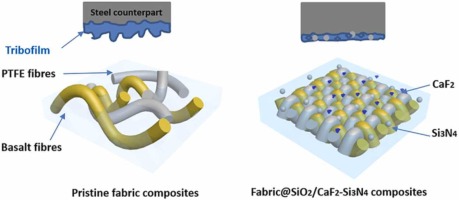Abstract
The tribological properties of fabric liners were seriously affected by the poor interfacial adhesion and high-temperature carrying capacity. Therefore, it was necessary to modify the fabric surface and enhance the thermal stability of fabric liners to meet the requirements of harsh conditions. Herein, dopamine (DA), poly-ethyleneimine (PEI), and SiO2 nanoparticles were co-deposited onto the surface of Basalt/PTFE fabric in an eco-friendly and mild method to enhance interfacial adhesion. The obtained organic-inorganic hybrid coating endowed the fabric surface with increased reactive groups and roughness, promoting the mechanical inter-locking and chemical bonding between fabric and phenolic matrix, leading to an increase of 89% in interfacial adhesion. Moreover, the CaF2 and Si3N4 incorporated into the fabric composites coordinated with the interfacial modification to enhance the tribological performance of fabric composites. The thermal stability of fabric composites presented an effective improvement with the addition of CaF2 and Si3N4. It was surmised that the Fabric@SiO2/CaF2-Si3N4 composites showed the optimal tribological performance with wide temperature range resulting from the enhanced interfacial adhesion and thermal stability as well as the formed robust tribofilm.

Keywords Plus:CARBON NANOTUBESWEAR PROPERTIESHYBRIDFIBERFRICTIONNANOSHEETS
Published in TRIBOLOGY INTERNATIONAL,Volume169;10.1016/j.triboint.2022.107495,MAY 2022


